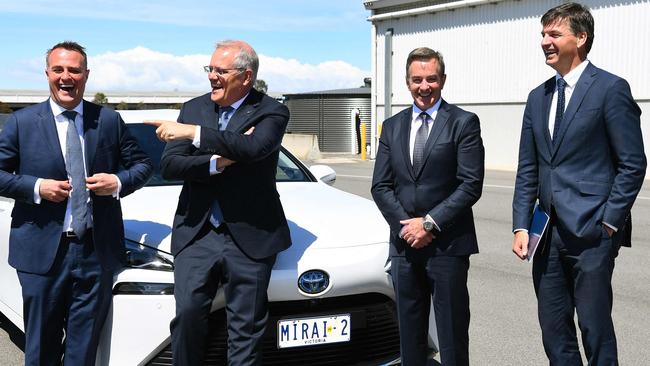
Radio silence and resistance from the Coalition was no longer an option, with the states, territories, federal opposition, trading partners and companies adopting ambitious net-zero and renewable energy targets.
The government’s flurry of climate change announcements – headlined by its net-zero emissions by 2050 plan – has been crafted to avoid a backlash from city and country supporters.
Yet straddling both sides of the fence is a balancing act that could blow up in the Coalition’s face after spending more than a decade eviscerating Labor’s carbon tax and electric vehicles policies, and its emissions and renewable energy targets.
Despite disembowelling Bill Shorten’s climate change policies at the 2019 election, Morrison could no longer ignore mounting pressure from his own Liberal MPs, AUKUS partners Boris Johnson and Joe Biden, South Pacific leaders, financiers and the private sector.
The rise of Anthony Albanese – taking over a bruised Labor Party after three successive election losses – also changed the game.
Albanese ignored pressure from the Left to keep faith on climate targets, declaring he would not follow Shorten down an election-losing path. He refined Labor’s messaging on coalmining, refused to take the bait on opposing tax cuts for middle- and high-income earners and promoted clean energy jobs in the regions.
Morrison’s net-zero plan, electric vehicle strategy, medium-term emissions reduction projections and low-emissions technologies road map were designed to goad Labor into making rash decisions on climate change.
Some Labor MPs who believe Twitter represents mainstream Australia have gleefully invoked Morrison’s comments that Shorten’s electric vehicles target would have “ended the weekend”, forgetting the policy contributed to them losing an election.
Albanese and his senior team are more focused on the end game, and have spent the past two years chipping away at Morrison’s character and targeting his failures because they view him as the biggest barrier to ending their losing streak.
The key to Morrison’s climate change message is clear: no taxes, no mandates forcing Australians to alter their lifestyles, no market intervention. Any overreach by Albanese will be ruthlessly exploited by Morrison.
For all the internal turmoil and weeks of agonising inside Coalition ranks, the Glasgow COP26 summit will be a distant memory come May.
Morrison – who is locked out of Western Australia, Queensland, Tasmania and South Australia – reminded Labor strategists this week of his indefatigable approach to campaigning. Similar to 2019, he has set up a six-month campaign to wear down Albanese and shift the debate to the economy, pandemic management and national security.




Scott Morrison’s climate change pivot is a pragmatic bet that the world has shifted and Australians want stronger action from governments.